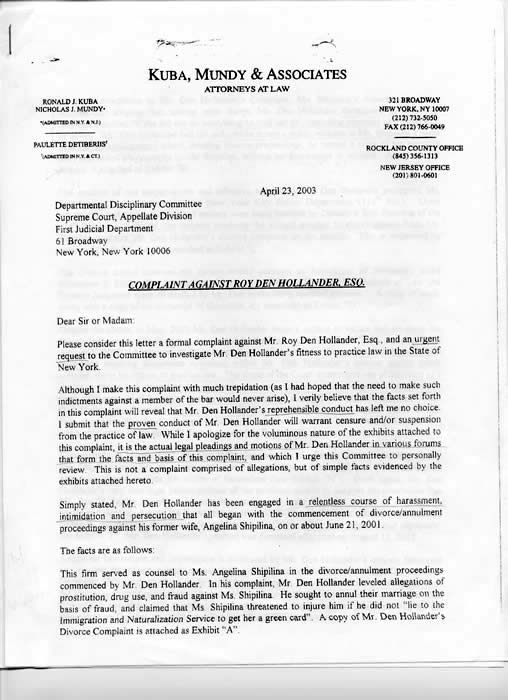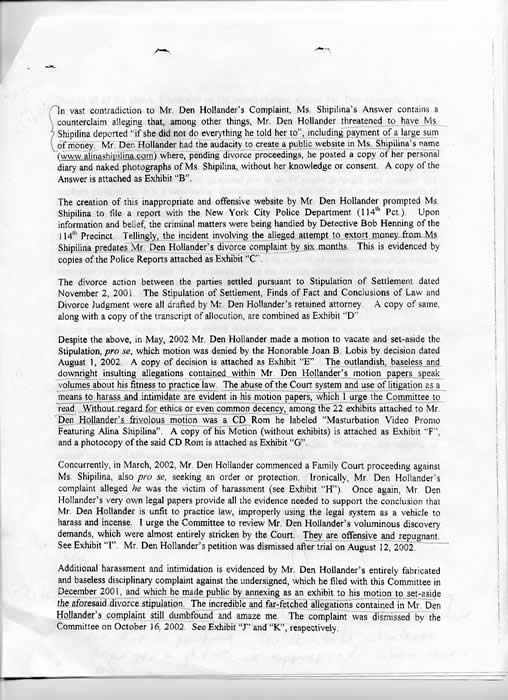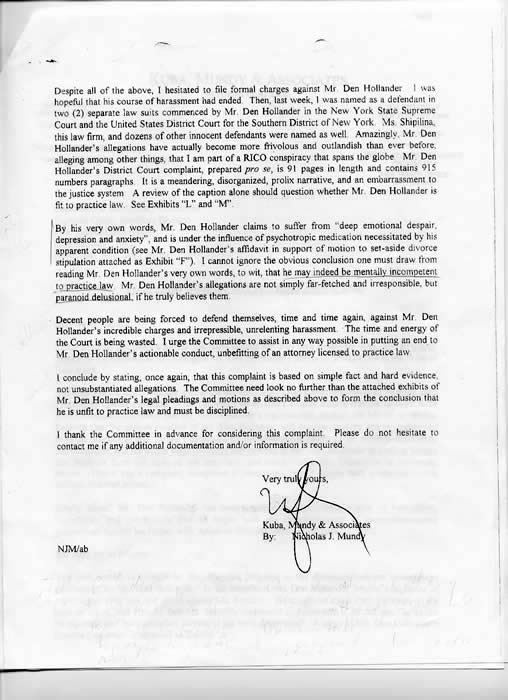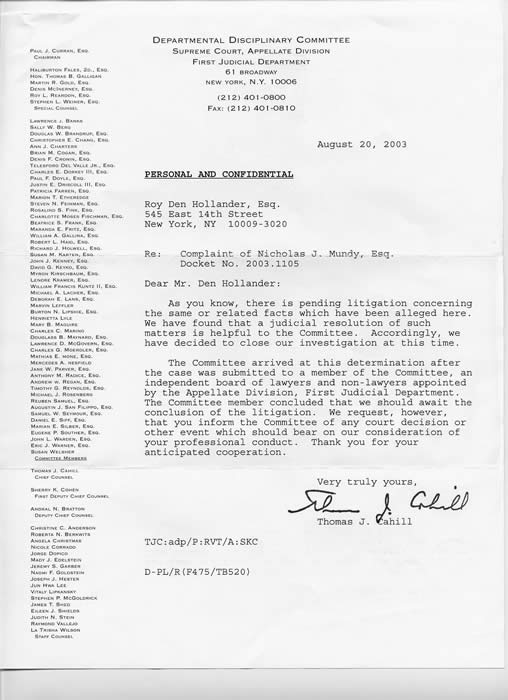





ROY DEN HOLLANDER
Attorney at Law
545 East 14th Street Tel. & Fax: (212) 995-5201
New York, NY 10009 Mobile 917 687 0652
June 12, 2003
Thomas J. Cahill
Departmental Disciplinary Committee
Supreme Court, Appellate Division
First Judicial Department
61 Broadway
New York, NY 10006
Complaint of Nicholas J. Mundy, Esq.
Dear Mr. Cahill:
This letter serves as my response to Nicholas J. Mundy’s complaint. Mr. Mundy’s complaint does not – and cannot – specify a single disciplinary rule or other regulation that I allegedly violated.
The real reason for his “complaint” is that his firm, and he personally, are defendants in a R.I.C.O. action that I filed in federal court on April 18, 2003. The R.I.C.O. complaint alleges a Russian-New York enterprise that violates R.I.C.O. and numerous other laws. The enterprise brings prostitutes to New York and other states in the U.S.A., passes drugs and huge sums of money back and forth between the countries, creates and traffics in pornography, and threatens physical violence to anyone who might get in the way. A central member and site of the enterprise’s illegal actions is the establishment called “Flash Dancers Topless Club,” located on Broadway and 52d Street in New York City. In addition, the enterprise often acts in other countries where there is a link of some kind, such as a connection to a brothel in Cyprus that some defendants control, or to specific participants in the enterprise traveling in other places.
Unfortunately for me, one of the aims of the enterprise was for prostitutes in Moscow to deceive American businessmen into marrying them so that the prostitutes could gain legal entry into the U.S.A. I was one of the deceived husbands. In total – and naïve – good faith, I married Ms. Shipilina shortly before I returned to the U.S.A. from my Moscow consultancy with a large American company.
When we returned to the U.S.A., shortly thereafter, my “wife” immediately joined her cohorts in prostitution, working out of “Flash Dancers Topless Club,” tried to engage me in criminal activity, drugged my food to deter me from seeking an annulment or divorce, and threatened me with violence from her Russian associates once I sought an annulment/divorce.
I learned my “wife” worked as a prostitute and was using me for immigration purposes after translating a portion of her diary, which she kept in plain sight. When the annulment/divorce action commenced, I began searching in Russia for information and witnesses relevant to the court proceeding. My investigation discovered, among other culpable conduct, that she had created a pornographic video with very graphic acts and advertised her sexual services via naked photographs. In one case, there is direct evidence that she sold these naked photographs to a man for 10 Cypriot pounds after performing sexual acts on him when she worked in Cyprus for the brothel “Zygos”. The pornographic video, which was imported into America, was produced by a California doctor and Ms. Shipilina’s Moscow procurer. The clips from the video that comprise the CD Rom are used to advertise the services sold by Ms. Shipilina’s Moscow procurer.
Ms. Shipilina’s own representative, Mr. Mundy, hypocritically criticizes the use of these photographs, CD and a portion of her diary that were employed in an attempt to discover even more evidence of her fraud on me and her criminal activities. The Russian language web site was created as a means to find new Russian witnesses, acquire additional information and communicate the truth to potential witnesses and informants after previously forthcoming witnesses and individuals with useful information were being threatened into silence. The web site contained only a small sampling of Ms. Shipilina’s widely offered pornographic services and extensive criminal exploits. After a period of time, the web site was closed when it no longer produced evidence.
My investigation disclosed not only marriage fraud but also fraud on the Immigration and Naturalization Service, fraud on the U.S. Department of State, prostitution, pornography, drug smuggling, money laundering and other criminal conduct. As a result, unidentified men have called me by telephone to threaten my physical safety if I pursue my rights in the courts; I even have tape recordings of some of those telephone calls.
Mr. Mundy and his firm participate as full principals in some of this illegal conduct. Among other acts alleged in the R.I.C.O. complaint, and as described below, a firm employee, while I was in the firm’s offices, urged me to lie to the Immigration and Naturalization Service, which I would not do.
Ultimately, I filed the R.I.C.O. complaint, asking for an injunctive order of protection for myself, together with damages and costs. That complaint was sent by mail to Mr. Mundy on April 21; his April 23 complaint to this body followed—two days later. Obviously he is not only trying to deter my use of the legal system by claiming that the filing of a R.I.C.O. complaint is evidence of unfitness to practice law, but he is also attempting to thwart the purpose of Congress in enacting the civil R.I.C.O. statute: “Those who have been wronged by organized crime should at least be given access to a legal remedy.” Congressional hearings quoted in Sedima, S.P.R.L. v. Imrex Co., Inc., 473 U.S. 479, 487, 105 S.Ct. 3275, 3280 (1985). Mr. Mundy is attempting to deny me access to a legal remedy by filing unproven and unfounded allegations with this Committee.
Mr. Mundy’s “urgent request” to have this Committee censure or suspend me from practicing law is aimed at denying me the right to earn a living, and intends to allow Mr. Mundy to use character assassination in an effort to distract the federal court from the merits of the case. A unique R.I.C.O. defense, but that is Mr. Mundy’s strategy: throw enough mud and maybe some will stick; make enough misrepresentations and maybe some will be believed.
The federal court will provide defendant Mundy the opportunity to refute the detailed allegations of the R.I.C.O. complaint where the trier of fact, and not he, will decide whether his characterizations of the complaint hold any merit.
On the whole, Mr. Mundy’s complaint to this Committee is very general name-calling, but there are a number of false statements based on half-truths and deceptions, some of which, in their own right, may constitute mail fraud under the R.I.C.O. statute.
Page 1, paragraph 3. Mr. Mundy falsely states that our prior dealings began with my commencing a divorce and annulment action in June 2001. As stated in my July 10, 2002 disciplinary complaint against a Russian lawyer, who was not licensed to practice law but was doing so anyway while working for Mr. Mundy, our dealings began on October 30, 2000. See Exhibit A. On that date Ms. Shipilina, a Russian alien who grew up in Chechnya, and I met with the Russian lawyer for advice on separating. The Russian lawyer, after consulting with Mr. Mundy, suggested that the two of us lie to the Immigration and Naturalization Service (“I.N.S.”) about the date of our separation and that I lie to the I.N.S. in an affidavit to help obtain Ms. Shipilina a green card.
Other dealings with Mr. Mundy’s office prior to June 2001 involved Ms. Shipilina filing for a temporary order of protection against me on January 31, 2001 in which she lied to the court. Five days later, Mr. Mundy sent me a letter stating that if I did not respond within seven days, he would commence “difficult” divorce proceedings against me. See Exhibit B. On advice of counsel, I commenced a divorce and annulment action on February 13, 2001. See Exhibit C. Then in March 2001, Mr. Mundy lied to my attorney in an effort to coerce me into a settlement by saying he possessed medical records showing I had repeatedly battered my wife. This is contained in my December 21, 2001 disciplinary complaint against Mr. Mundy, see Exhibit D, and my October 26, 2002 request for reconsideration of this Committee’s decision, see Exhibit E.
Page 1, paragraph 4. Mr. Mundy appears to allege that the complaint filed in my divorce and annulment action is grounds for this Committee’s sanctions. If he believes that, then logically he should file a disciplinary complaint against my lawyers who prepared the complaint. But, on information and belief, he has not, since it is my constitutional rights that Mr. Mundy wants to chill through state action and not those of my divorce lawyers.
Page 2, paragraph 2. I had consulted with an attorney friend on the advice given by the Kuba, Mundy & Associates law firm that I lie in an affidavit to the I.N.S. In no uncertain terms, my friend confirmed that my decision not to lie was the only acceptable course of action. I then notified Ms. Shipilina that I would not lie for her to the I.N.S. and subsequently she filed a false police report—not a complaint—with 114th Police Precinct. She declined to press charges at the time of filing. The report was most likely intended to create a false record by which Mr. Mundy could pressure me into lying before the I.N.S. in order to obtain his client a green card. See July 10, 2002, Disciplinary Complaint, Exhibit A.
Page 2, paragraph 3. I agreed to settle the annulment/divorce action as a direct result of a threatening telephone call I received in October 2001 from an individual calling himself John Madison. The caller said he was telephoning on behalf of my “soon to be ex-wife, Angelina.” Ms. Shipilina uses the name Angelina when she strips at Flash Dancers Topless Club. I felt extremely threatened and decided not to take any chances with my physical safety.
If this Committee wishes, I can provide a tape of the threatening telephone call, a copy of which Mr. Mundy also possesses.
Page 2, paragraph 4. In an action for reformation of a divorce settlement that essentially requests damages for emotional distress, could anything demonstrate emotional distress more effectively than a man discovering that the woman he loved and cherished was, and apparently continued to be, a porn star who had deceived him into marriage so that she could ply her wares in a hard currency market? I don’t think so.
Mr. Mundy makes unspecified references to the motion for reformation as “outlandish, baseless and downright insulting.” If he would indicate the allegations to which he objects and why, rather than engaging in vituperative generalizations and asking this Committee to do his work by determining the sections that Mr. Mundy is referring to, then as required by your cover letter, I will provide specific responses.
Page 2, paragraph 5. Mr. Mundy omits that the action to obtain an order of protection in March 2002 occurred after two more threatening telephone calls were made by a man who sounded like the John Madison from the first menacing call in October 2001. In these two other calls, the man referred to himself as John Pierre, and once again said he was calling on behalf of Angelina. The purpose of these terrorizing calls was primarily to prevent me from providing information to the I.N.S. concerning Ms. Shipilina’s fraud on the I.N.S. and U.S. State Department in obtaining an immigrant visa.
After a February 2002 call, I filed a complaint with the 13th Police Precinct. The Federal Bureau of Investigation (“F.B.I.”) did start a preliminary investigation and apparently identified the man making the threats, but the F.B.I. agents refused to tell me his name. One of the agents, however, did tell me that the F.B.I. decided not to interview the man for fear he might cause me harm. Then in March 2002 I received another threatening call, and I filed for an order of protection in the Family Court. Unfortunately, the judge refused to grant me a discovery subpoena for telephone records that would have led to identifying the man making the threats and enable me through the discovery process to link that man with Ms. Shipilina.
If this Committee wishes, I can provide a tape of the February menacing call, a copy of which Mr. Mundy also possesses.
Page 2, paragraph 6. Mr. Mundy fails to mention my request for reconsideration of this Committee’s decision and the making of an additional complaint on October 26, 2002. See Exhibit E. Mr. Mundy claims the case is closed, but recently I received a card from this Committee stating that my request for reconsideration has been granted. See Exhibit F.
My request for reconsideration was based on this Committee not addressing the allegation that Mr. Mundy falsely told my divorce attorney that he possessed medical records showing I repeatedly beat my wife. Since no such records existed, Mr. Mundy’s statement violated DR 1-102[1200.3] for engaging in deceit and misrepresentation.
In addition, Mr. Mundy’s statement about records of wife beating constituted coercion in the second degree, N.Y. Penal 135.60, since the clear implication was that unless I settled the case on terms agreeable to his client, I would be accused of battery and face contempt or ridicule, or harm to my business, calling, career, financial condition or personal relationships by publication of that false statement. Furthermore, at the time of Mr. Mundy’s misrepresentation, which instilled fear in me, others had made no previous publication of such charges. See Exhibit E.
Page 3, paragraph 1. Mr. Mundy, who apparently didn’t read the R.I.C.O. complaint, fails to state that the federal action includes the cause of action filed in the New York State Supreme Court. They are not two distinct lawsuits. The New York State court case was commenced by a “summons with notice” for procedural purposes and contains only one cause of action. This cause of action is included in the R.I.C.O. complaint and will most likely be removed to the federal court under that court’s pendent jurisdiction.
Mr. Mundy argues against my right to file a federal R.I.C.O. complaint that was based on detailed and deep research, and which was drafted with the assistance of a very well-respected attorney. Mr. Mundy’s argument, though, is only a set of sweeping generalizations that even claim that certain notorious Russian criminals are innocent victims.
If Mr. Mundy is concerned with the substance, length and perhaps even the weight of the R.I.C.O. complaint, it would appear to be more appropriate to take such matters up with the federal court rather than attempting to use this Committee as a surrogate for federal procedure.
Mr. Mundy goes so far as to request this Committee “to assist in any way possible in putting an end to Mr. Den Hollander’s actionable conduct,” which, in substance, is an attempt to misuse this Committee to deny me of my civil right to bring a R.I.C.O. suit. Before all the defendants have even been served, Mr. Mundy’s strategy is clear: use this Committee to pressure me into withdrawing the federal claim.
In conclusion, Mr. Mundy seeks to have this Committee punish me for exercising my civil rights as a threatened and aggrieved individual. Mr. Mundy does not cite any ethical canons or disciplinary rules that I allegedly violated. Instead, he resorts to castigating me as mentally unfit to exercise my rights because while experiencing a terrible situation, in part, intentionally created by Mr. Mundy, I sought temporary, appropriate medical help.
I thank this Committee for reviewing my answer. Please contact me if any additional information is required.
Very truly yours,
Roy Den Hollander
